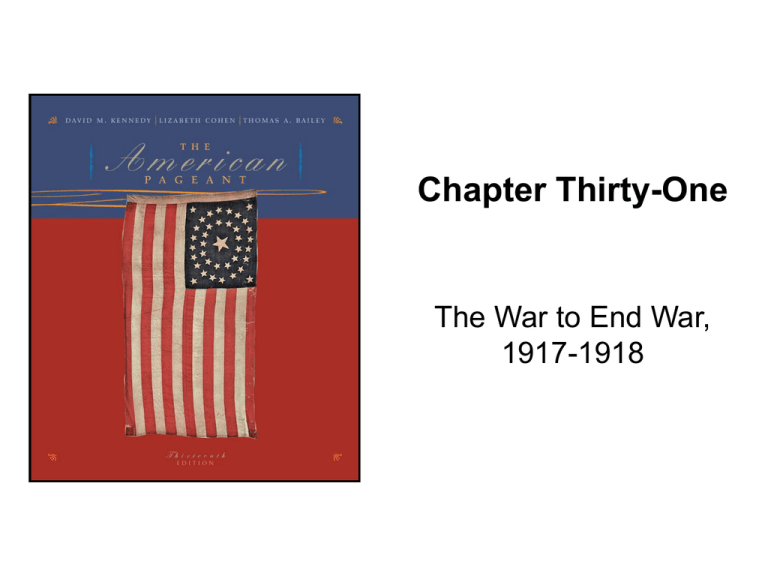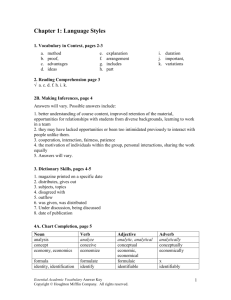
Chapter Thirty-One
The War to End War,
1917-1918
Kennedy, The American Pageant
Chapter 30
The immediate cause of American
entry into World War I was
1. German support for a possible Mexican invasion
of the southwestern United States.
2. Germany’s resumption of unrestricted submarine
warfare.
3. the German defeat of France.
4. desire of American munitions makers for large
profits.
Copyright © Houghton Mifflin Company. All rights reserved.
30-2
Kennedy, The American Pageant
Chapter 30
The immediate cause of American
entry into World War I was
2. Germany’s resumption of unrestricted submarine
warfare.
Hint: See page 696.
Copyright © Houghton Mifflin Company. All rights reserved.
30-3
Kennedy, The American Pageant
Chapter 30
Wilson proclaimed that the American
entry into World War I was
1. an attempt to re-establish the European balance
of power.
2. a battle for free market capitalism against both
feudalism and Communism.
3. a crusade to make the world safe for democracy.
4. an opportunity to establish American control of the
Atlantic and prevent any future invasions of the
United States.
Copyright © Houghton Mifflin Company. All rights reserved.
30-4
Kennedy, The American Pageant
Chapter 30
Wilson proclaimed that the American
entry into World War I was
3. a crusade to make the world safe for democracy.
Hint: See page 697.
Copyright © Houghton Mifflin Company. All rights reserved.
30-5
Kennedy, The American Pageant
Chapter 30
Minority groups and oppressed
nations took hope from two of
Woodrow Wilson’s Fourteen Points
that called for
1. the establishment of parliamentary democracies
throughout Europe.
2. guarantees of basic human rights for all people in
the world.
3. the self-determination of peoples and antiimperialism.
4. a recognition of racial equality and social
integration.
Copyright © Houghton Mifflin Company. All rights reserved.
30-6
Kennedy, The American Pageant
Chapter 30
Minority groups and oppressed
nations took hope from two of
Woodrow Wilson’s Fourteen Points
that called for
3. the self-determination of peoples and antiimperialism.
Hint: See page 698.
Copyright © Houghton Mifflin Company. All rights reserved.
30-7
Kennedy, The American Pageant
Chapter 30
The stirring patriotic song that
captured America’s imagination and
inspired the “doughboys” during
World War I was
1. “God Bless America.”
2. “Over There.”
3. “There’ll Be a Hot Time in the Old Town Tonight.”
4. “Mademoiselles from Armintieres.”
Copyright © Houghton Mifflin Company. All rights reserved.
30-8
Kennedy, The American Pageant
Chapter 30
The stirring patriotic song that
captured America’s imagination and
inspired the “doughboys” during
World War I was
2. “Over There.”
Hint: See page 699.
Copyright © Houghton Mifflin Company. All rights reserved.
30-9
Kennedy, The American Pageant
Chapter 30
Two prominent Americans who were
convicted under the Espionage and
Sedition Acts were
1. H. L. Mencken and Theodore Dreiser.
2. Robert La Follette and Hiram Johnson.
3. Jane Addams and Alice Paul.
4. Eugene V. Debs and William Haywood.
Copyright © Houghton Mifflin Company. All rights reserved.
30-10
Kennedy, The American Pageant
Chapter 30
Two prominent Americans who were
convicted under the Espionage and
Sedition Acts were
4. Eugene V. Debs and William Haywood.
Hint: See page 700.
Copyright © Houghton Mifflin Company. All rights reserved.
30-11
Kennedy, The American Pageant
Chapter 30
Among the primary victims of the
pro-war propaganda campaign to
enforce loyalty were
1. German Americans and socialists.
2. Russian Americans and Communists.
3. Mexican Americans and immigrants.
4. African Americans and feminists.
Copyright © Houghton Mifflin Company. All rights reserved.
30-12
Kennedy, The American Pageant
Chapter 30
Among the primary victims of the
pro-war propaganda campaign to
enforce loyalty were
1. German Americans and socialists.
Hint: See page 700.
Copyright © Houghton Mifflin Company. All rights reserved.
30-13
Kennedy, The American Pageant
Chapter 30
In the intermediate aftermath of
World War I, American women
1. won a constitutional amendment granting women
the right to vote but lost their wartime economic
gains.
2. turned their attention toward winning an Equal
Rights Amendment to the Constitution.
3. lost ground in their fight to obtain the right to vote.
4. failed to pass a law providing for federal
instruction in maternal and infant health care.
Copyright © Houghton Mifflin Company. All rights reserved.
30-14
Kennedy, The American Pageant
Chapter 30
In the intermediate aftermath of
World War I, American women
1. won a constitutional amendment granting women
the right to vote but lost their wartime economic
gains.
Hint: See page 703.
Copyright © Houghton Mifflin Company. All rights reserved.
30-15
Kennedy, The American Pageant
Chapter 30
The federal government’s promotion
of such things as “Victory Gardens”
and “heatless Mondays”
demonstrated
1. the severe shortage of food and fuel that
restricted the American war effort.
2. America’s reliance on largely voluntary means
rather than coercion in the war effort.
3. the attempt to return to a more self-sufficient,
pioneer lifestyle during the war.
4. the integration of military and civilian values
during the war.
Copyright © Houghton Mifflin Company. All rights reserved.
30-16
Kennedy, The American Pageant
Chapter 30
The federal government’s promotion
of such things as “Victory Gardens”
and “heatless Mondays”
demonstrated
2. America’s reliance on largely voluntary means
rather than coercion in the war effort.
Hint: See page 704.
Copyright © Houghton Mifflin Company. All rights reserved.
30-17
Kennedy, The American Pageant
Chapter 30
The huge Allied military effort that
finally forced the Germans to appeal
for a truce and a peace settlement
was
1. the Meuse-Argonne Offensive.
2. the Battle of Chateau-Thierry.
3. the Second Battle of the Marne.
4. the Battle of Verdun.
Copyright © Houghton Mifflin Company. All rights reserved.
30-18
Kennedy, The American Pageant
Chapter 30
The huge Allied military effort that
finally forced the Germans to appeal
for a truce and a peace settlement
was
1. the Meuse-Argonne Offensive.
Hint: See pages 708–710.
Copyright © Houghton Mifflin Company. All rights reserved.
30-19
Kennedy, The American Pageant
Chapter 30
Senator Warren Harding effectively
undermined the Democrats’ efforts to
make the election of 1920 a
“referendum” on the League of
Nations by
1. choosing a strongly pro-League vice presidential
candidate, Calvin Coolidge.
2. muddling the issue and appealing to both
supporters and opponents of the League.
3. showing the weakness of Wilson’s pro-League
arguments during public debates.
4. refusing to say absolutely anything about the
League or the Treaty of Versailles.
Copyright © Houghton Mifflin Company. All rights reserved.
30-20
Kennedy, The American Pageant
Chapter 30
Senator Warren Harding effectively
undermined the Democrats’ efforts to
make the election of 1920 a
“referendum” on the League of
Nations by
2. muddling the issue and appealing to both
supporters and opponents of the League.
Hint: See page 716.
Copyright © Houghton Mifflin Company. All rights reserved.
30-21


